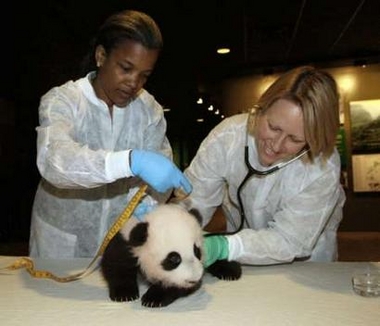|
D.C. zoo panda cub gets a name: Tai Shan
(AP)
Updated: 2005-10-17 21:38
The National Zoo's giant panda cub, known to its keepers simply as "the Cub"
since his birth 100 days ago, finally has a name: Tai Shan, which means
"peaceful mountain."

Assistant Curator Lisa Stevens measures the
giant panda cub while Chief Veterinarian Suzan Murray listens to its heart
and lungs during its eighth health exam at the Smithsonian's National Zoo
on October 12, 2005. The giant panda cub born on July 9, now weighs 12.7
pounds and is 25.5 inches long. National Zoo staff also noted that the cub
now has upper and lower incisor and canine teeth.
[Reuters] |
The name, one of five proposed for the little cub, received 44 percent of the
estimated 200,000 votes cast on the zoo's Web site, zoo officials said Monday.
The little panda went without a name for its first hundred days in observance
of a Chinese custom. It's rare for pandas born in captivity to live more than a
few days, and keeping the animals nameless is seen as a way to trick fate into
letting them survive.
The cub wasn't present at his naming ceremony. Zoo officials say he probably
won't be making his public debut until sometime in December, since his mother is
still quite protective of him.
Panda fans celebrated the 100-day milestone at a zoo ceremony featuring
performances by Chinese dance troops and martial artists. Officials from China
delivered speeches toasting the fuzzy little cub.
Tai Shan, pronounced "tie-SHON," spent the morning with his mother, Mei
Xiang, in a den that's still off limits to zoo visitors. His handlers are slowly
introducing him to the exhibit enclosure where he's expected to go on public
view within the next couple months.
The male cub, born July 9, is the first giant panda born at the National Zoo
to survive more than a few weeks. Mei Xiang and the father, Tian Tian, are on a
10-year loan from China. The cub will be sent to China when it is 2.
The panda cub recently took its first steps and zoo examiners say its teeth
have started coming in. They said the cub has also begun to exhibit signs that
he's ready to play. On Sunday, Mei Xiang was resting on her platform when the
cub stretched up and touched his nose to hers, then swatted her with his paw.
When the mother came down from the platform and picked him up, he squirmed and
swatted her again.
The China Wildlife Conservation Association and zoo officials had selected
five names from which voters could choose. The others were: Hua Sheng, which
means "China Washington" and "magnificent;" Sheng Hua, which means "Washington
China" and "magnificent;" Long Shan, which means "dragon mountain;" and Qiang
Qiang, which means "strong, powerful."
|